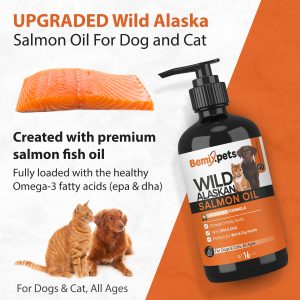Omega-3 fatty acids are a type of essential fatty acid. This means that omega-3 fatty acids cannot be created by the body and must be eaten. This fat is very important for the health of our dogs.
Contents
Benefits of Omega-3s for Dogs
One of the main benefits of omega-3 fatty acids is that they help to reduce inflammation in the body. Chronic inflammation has been linked with almost all diseases. This means that chronic inflammation can be a cause of disease. Thus, it is if paramount importance to reduce inflammation where possible.
Omega-3 fatty acids help to improve the skin and coat of dogs. This fat works to hydrate and keeps a good moisture balance in the skin. Omega-3 fatty acids help to build collagen which in turn is good for, not only, skin and coat but also joints.
This means that omega-3 fatty acids can help prevent arthritis or reduce the pain of dogs already suffering from arthritis. It helps by lubricating the joints.
In some cases, a good omega-3 supplement has been linked to curing skin allergies in dogs. Omega-3s help the skin build a stronger barrier. So when the skin contacts an allergy source it is better defended.
Omega-3 fatty acids include EPA and DHA. EPA and DHA are required for a healthy brain. Supplementing a pregnant dog with omega-3s can help with the brain development of the fetus. It is good to supplement with omega-3s for the whole life of a dog to help keep their brain sharp!
Omega-3s have been shown to help reduce and prevent cancers from developing. They have been linked to reducing the size of tumors as well.
Omega-3 fatty acids can help with the treatment of kidney disease. These fats help to stimulate appetite and help with frequent urination.
Omega-3s help to boost the overall immune system of dogs. A healthy immune system can help to keep your dog healthy and happy.
Is there Anything Negative Associated with Omega-3s?
Omega-3s may increase your dog's body weight. This is easily fixed by a slight diet or exercise adjustments.
Omega-3 fatty acids may sometimes slow down the response time of white blood cells. This may lead to slower wound healing.
Depending on the omega-3 fatty acid you choose it could give your dog bad breath. Just keep up with brushing your dog's teeth and there shouldn't be an issue.
Supplement Options for Omega-3 Fatty Acids
First, let's cover a few things about omega-3s that you should keep in mind when looking at a supplement. Omega-3 fatty acids are very fragile. Air, heat, and light can destroy them and render them useless. As such, it is a good idea to look for supplements that are not heat-treated in any way. So freeze-dried or cold-pressed is best. To avoid air, look for a supplement to come in a glass bottle. Dark-tinted containers are best to avoid the supplement coming into contact with light.
For the oils, it is a good idea to find oils that have gone through molecular distillation. This will help to remove as many contaminants as possible without damaging the omega-3s. Always be sure to get sustainably sourced supplements.
Salmon oil can be a good option. Be sure to get cold-pressed, wild-caught salmon oil. Wild-caught will help to reduce the amount of contaminates the oil may contain
Fish oil is another option. Be careful when sourcing fish oil. Look for fish oils made of smaller fatty fish like sardines, mackerel, and anchovies caught in the Atlantic ocean. These will contain a lot less contaminates then bigger fish. Also, choose a fish oil with a natural source of vitamin E added. This helps to protect the oil from oxidizing.
Krill oil is another option. Kill is not only high in omega-3s but it also has the antioxidant astaxanthin. Be sure the krill oil you buy is sustainably sourced and cold-pressed.
Phytoplankton is an excellent option. If you can find an excellent quality source, phytoplankton is much less likely to be contaminated with heavy metals and things. Phytoplankton is generally more sustainable than other omega-3 options as well. Phytoplankton has the added benefit of being high in minerals,
How much Omega-3s Should My Dog Get?
It is best to follow the manufacturer of the supplement's advice on this. Or the advice of your vet. If you choose to use a product made for people and not pets, be sure to adjust the dose. Assume that the human dose if for a 150lb human.
Our recommendation
We recommend Bemix Pets Upgraded Salmon oil. They have 5 stars on Amazon.
Click here to get the 22% OFF discount.
Summary
Omega-3 fatty acids are essential! They are wonderful for reducing inflammation. They can help to prevent or alleviate many health issues in dogs.
You can find omega-3 fatty acids in many different forms. Be sure to source the best possible supplements for your dog.
If your dog has an allergy to fish perhaps krill oil will work better or phytoplankton. There is always an option of good omega-3s for your dog.






Leave a Reply
You must be logged in to post a comment.